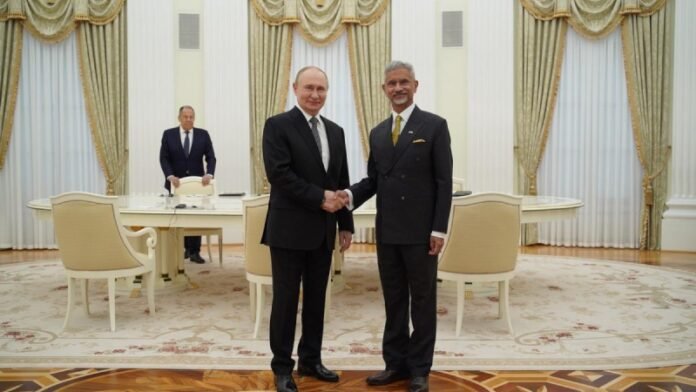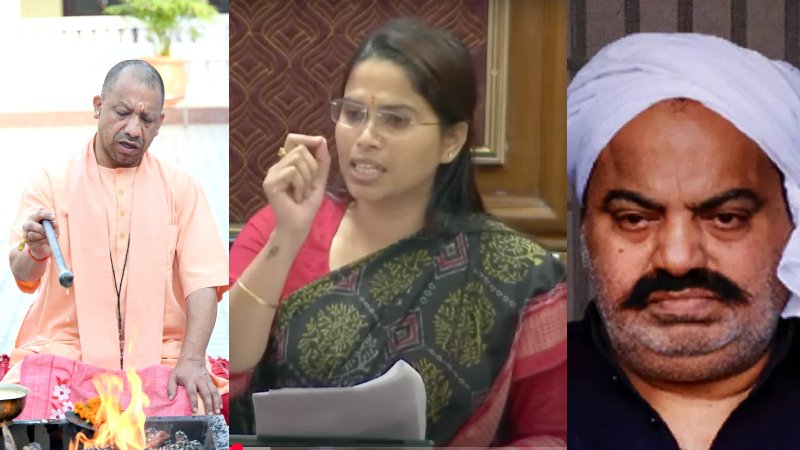External Affairs Minister (EAM) S. Jaishankar concluded a three-day visit to Russia on Thursday (August 21). Before leaving for Moscow, EAM S. Jaishankar met his Chinese counterpart. The US’s unfair and unjustified tariffs have pushed India, China and Russia closer in a few weeks.
Jaishanker’s visit to Moscow combined high-level diplomacy with economic pragmatism and also touched on global tensions around the Ukraine war and India’s energy trade.
Meeting with President Putin
On the final day of his visit, Jaishankar met Russian President Vladimir Putin in Moscow. He conveyed greetings from President Droupadi Murmu and Prime Minister Narendra Modi. The two leaders reviewed the state of bilateral ties and discussed important global issues, with special focus on the Ukraine conflict.
Jaishankar later shared on X (formerly Twitter) that the meeting was cordial and constructive. He emphasised India’s consistent call for diplomacy to resolve the conflict.
The talks also helped fine-tune preparations for President Putin’s upcoming visit to India. The Russian leader is expected to travel to New Delhi in late 2025 for the annual bilateral summit, likely in November or December.
Energy and Economic Focus
Earlier in the day, Jaishankar held detailed discussions with Russian Foreign Minister Sergey Lavrov. Both leaders focused on the energy partnership, which has become one of the main pillars of India-Russia relations.
Lavrov highlighted the success of current hydrocarbon cooperation and proposed new joint energy ventures in Russia’s Far East and Arctic regions. Jaishankar welcomed these ideas, as energy security is vital for India’s growth.
Both sides also reviewed steps to expand bilateral trade. Both governments have set an ambitious target of USD 100 billion by 2030. Key measures include smoother payment systems, resolution of tariff barriers, and finalising the India–Eurasian Economic Union Free Trade Agreement.
“One of the Steadiest Partnerships”
At a joint press event, Jaishankar underlined the durable nature of the India–Russia partnership.
“We believe that relations between India and Russia have been among the steadiest of the major relationships in the world after the Second World War,” he stated. He pointed to geopolitical convergence, leadership dialogue, and populargoodwill as the key pillars of this long-standing bond.
The minister also addressed Russia’s wider role in multilateral forums. Both countries reaffirmed cooperation within BRICS, G20, and the Shanghai Cooperation Organisation. India pressed for reforms in the United Nations Security Council to reflect contemporary realities.
Talks at the Inter-Governmental Commission
During the visit, Jaishankar co-chaired the 26th Session of the India–Russia Inter-Governmental Commission (IRIGC‑TEC) with Russian First Deputy Prime Minister Denis Manturov. The session covered trade, technology, connectivity, and skilled labour mobility.
A protocol was signed to guide future cooperation. The ministers also spoke at the India–Russia Business Forum, which agreed to link industry consultations more closely with IRIGC working groups.
Diplomatic Storm with Washington
The Moscow visit came as India faces rising trade friction with the United States. Washington, under President Donald Trump, recently imposed 50 per cent tariffs on Indian exports. The move is retaliation for India’s continued imports of discounted Russian crude oil.
New Delhi has called the US tariffs unfair and damaging. Moscow described them as “neo-colonial.” In response, Russian diplomats announced a “special mechanism” to guarantee uninterrupted oil supplies to India, even under possible secondary sanctions. Moreover, Moscow added 5% discount on all oil imports by India.
Speaking in Moscow, Jaishankar pushed back against criticism from Washington. He argued that India is not the biggest buyer of Russian oil and noted that India’s oil imports from the US have actually increased. “It is puzzling why India is being singled out,” he remarked.
Broader Security Dialogue
Apart from energy and trade, discussions also covered defence, connectivity, and regional challenges. Issues in Ukraine, West Asia, and Afghanistan were reviewed. Jaishankar reiterated India’s zero-tolerance stance on terrorism.
Road Ahead
The visit set the stage for the next annual summit in India. Both sides identified trade expansion, energy security, and defence cooperation as key deliverables. Jaishankar also invited Foreign Minister Lavrov to visit New Delhi soon.
Dr. Jaishankar’s Moscow visit showcased India’s effort to balance diplomacy, energy needs, and trade strategy at a time of shifting global alignments. It underlined that India–Russia relations remain steady, even as New Delhi faces sharp economic pressure from Washington.
Due to American President Trump’s behaviour, the geopolitical faultlines are changing by pushing nations alike to diversify their diplomatic relation. India, China, and Russia’s engagements have increased, and due to the presence of a common threat, these three nations are looking to converge on common issues. Chinese Foreign Minister Wang Yi’s visit to India and EAM S Jaishankar’s visit to Moscow are part of this engagement.


